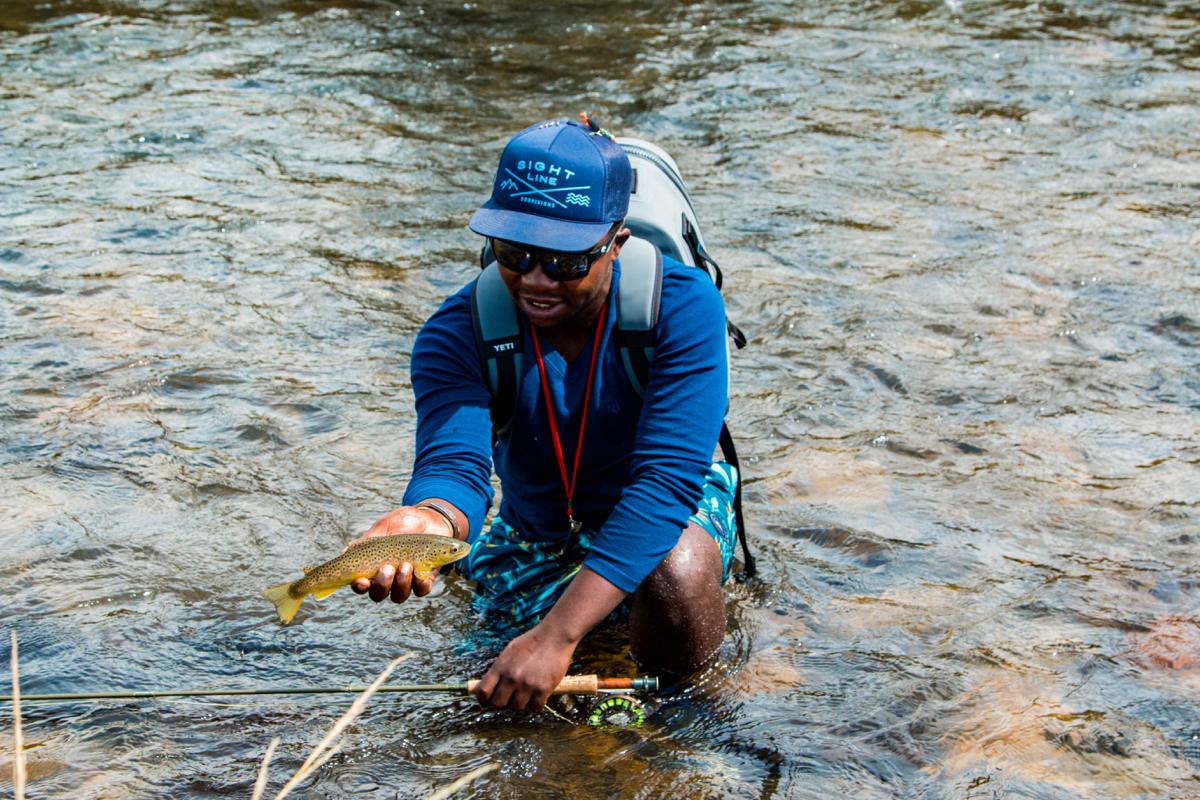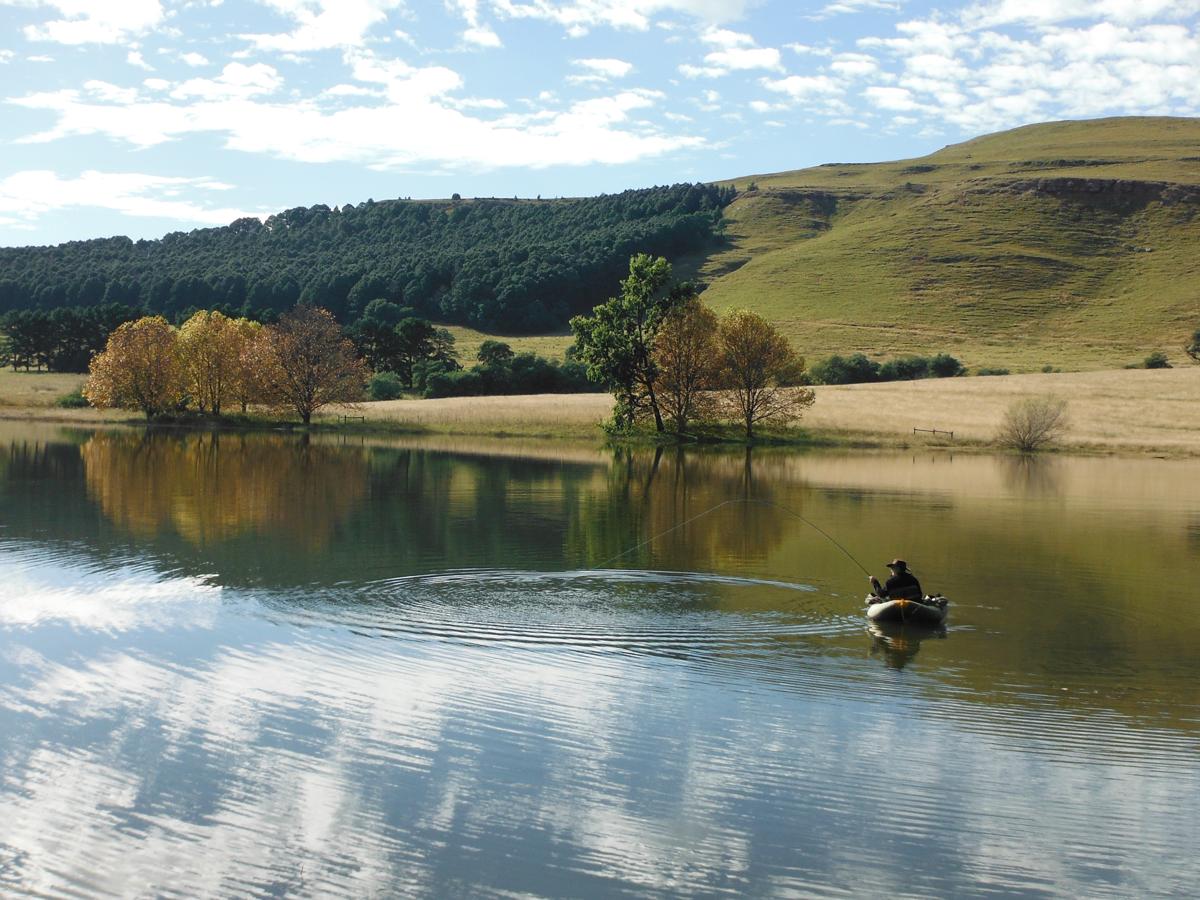
9 minute read
Trout Wars - Ian Cox...... The end of Decency
- AN UPDATE ON THE TROUT WARS
Ian Cox
Advertisement
The journalist John Yeld, interviewing his friend Dr. Guy Preston on his retirement, wrote of “the as-yet unresolved controversy over the status of alien trout species in South African waters” as one of the negatives in his career. Preston then went on to lump trout collectively with other socalled invasive species which he said had collectively posed a real cost to South Africa of “probably in the order of hundreds of billions of rands”.
The computer modelling that resulted in that estimate has been overblown in much the same way as the COVID modelling of epidemiologists has grossly exaggerated the effects of the pandemic. This should not come as a surprise. There is a natural tendency amongst those who make their living out of disasters to exaggerate things in support of their cause. The very considerable industry that Dr. Preston led in his fight against alien and invasive species is no exception to this.
This may be why the attempts of the environmental affairs to deal with alien and invasive species have been largely unsuccessful. Like Aesop’s boy who cried wolf, so it is that the excesses of the invasive species cult are increasingly being ignored.
It is also becoming increasingly obvious that the so-called war on so-called invasive species that Dr. Preston has spent so much of his life on has little to do with whether these species cause harm to human health and wellbeing. The focus of these and other so-called biodiversity conservation laws is really on increasing the government’s control over South Africa’s biological resources.
This is having the effect of incrementally depriving South African’s of the private property rights they once enjoyed in respect of biological resources. This process of an incremental nationalisation of private property rights is very much part of the broader ANC strategy of bringing the economy and all resources under direct government control.
I have spent some time in explaining this back story because it goes some way to explaining what ordinarily would be the extraordinary step the minister of Environment, Forestry and Fisheries, Barbara Creecy, took in amending the 2014 and 2016 alien and invasive species lists even though the legality of the publication participation process that preceded this law is the subject of the ongoing court action.
Sadly, this has not been entirely unexpected. Her predecessor the late Edna Molewa did much the same thing in the case that the Kloof Conservancy regarding her failure to list species as invasive within the time periods stipulated in the National Environmental Management Biodiversity Act or NEMBA.
Dr. Preston was very much involved in this as the deputy director-general responsible for environmental programs. This included the invasive species control program run by what was then the Department of Environmental Affairs.
On 19 July 2013 Minister Molewa unlawfully promulgated the 2103 AIS lists, thereby rendering the Kloof Conservancy application moot. Those who followed that case may remember that Dr. Preston deposed to a substantive affidavit just after this happened.
This abuse of government power forced Kloof Conservancy to launch an additional application setting aside the 2013 AIS Lists. This delayed the hearing of its case by over a year.
But the abuse did not end there. After the matter had been argued in court and while the judge was preparing his judgment, Minister Molewa replaced the 2013 AIS Lists with the 2014 AIS lists that still apply today.
The judge hearing the matter had some very harsh things to say about this conduct including criticism of what he referred to as “interim” regulations that were clearly unconstitutional and necessitated the bringing of an unnecessary review application, delaying the matter further.
He indicated his disapproval by ordering the minister to pay the Kloof Conservancy’s costs at the penal attorney and client scale. But this did not seem to concern the either Minister Molewa or her department. This is probably because these tactics served their purpose in preventing the Judge for delivering the judgment he wanted to.
We in the trout fight did not know this at the time, but the 2014 AIS lists only came about because of the agreement that was reached at the government’s Phakisa Ocean Lab in July 2014 that trout would not be listed as invasive where they presently occur. FOSAF’s Ilan Lax and Dr. Preston were key role players in reaching this agreement.
This was a huge victory for the multi-billion value chain that is underpinned by trout fishing. The trout value chain thereafter invested heavily in engaging with Dr. Preston and his department in the mapping of South Africa’s trout waters that was necessary to give effect to this agreement.
Unfortunately, as the months went by, it became increasingly apparent that Dr. Preston and his department were not dealing with the trout value chain in good faith. As it turned out, the pretence of implementing what became known as the Phakisa Agreement was maintained just long enough to map the whereabouts of South Africa’s trout waters. This had almost been completed in July 2017 when Dr. Preston wrote announced that the Department of Environmental Affairs was reneging on the Phakisa agreement.
So once again trout were to be listed as invasive even though there is no evidence at all that trout are invasive as the term is defined in law. But this is easier said than done. It requires a comprehensive public participation process which includes the publication of a draft of the proposed law in the Government Gazette and a nationally distributed newspaper as well as the supply of information reasonably necessary to enable the public to meaningfully make representations or objections.

Hatcheries have stocked trout in KZN dams for generations

It should come as no surprise that the Minister and Dr. Preston’s department botched this process.
FOSAF and other interested parties had asked Dr. Preston to explain how it was trout and many other species could be listed as invasive given the definition of an invasive species in NEMBA. FOSAF had even offered to make its legal team available to the department's lawyers so that the issue could be discussed lawyer to lawyer.
This offer was refused.
Not unsurprisingly, the draft amendment that was published for comment in February 2018 failed to provide the information the public reasonably required, both in relation to trout and a great number of other species. The department botched the publication process, despite several attempts to get it right.
This, and Dr. Preston’s dogged defence of the indefensible, resulted in FOSAF instituting legal proceedings for an order the whole process unlawful.
That case, which is being fought in the Pretoria division of the Gauteng High Court, was about to set down for hearing when the new 2020 AIS lists were promulgated by Minister Creecy on 18 September 2020.
Dr. Preston officially retired at the end of June this year so one cannot say with certainty that he was behind the promulgation of the amended AIS lists. However, it is not difficult to see the similarity between the tactics that were deployed back in 2013 and 2014 and those that are being used now.
On FOSAF will need to amend its application to include an order declaring the promulgation of the 2020 AIS Lists invalid on account of the failure of Minister Molewa to follow the legally prescribed consultation process.
It is not clear at the time of writing if this will delay the hearing of this matter. But what is clear is that the 2020 AIS Lists will be enforceable in law come 19 October 2020 unless further steps are taken to stop this. If this is allowed to happen one can expect the final determination of FOSAF’s case to be delayed for as long as is possible. This is not idle speculation. It is what the DEA did in the case of the judgement declaring the moratorium on the trade in rhino horn invalid. This was done in that case by employing Stalingrad tactics by making unsuccessful applications for leave to appeal all the way to the Constitutional Court.
The unlawful 2020 AIS Lists could therefor remain law for many years to come.
The damage that will be done in that time both to the trout value chain and the rule of law will be huge.
No one respects bad lawmaking or bad lawmakers. This is evident from the complete failure of the existing 2014 and 2016 AIS Lists and regulations that were also made law following an unlawful public participation process and indeed the general failure of NEMBA as a law due to repeated failures by DEA and DEFF to follow the proper process.
But the trout value chain is particularly vulnerable as most of the industry relies on the stocking from a very small number of trout farms. It should come as no surprise, therefore, to learn that the 2020 AIS Lists specifically target trout farms and stocking. Both will become criminal offences come 19 October 2020 unless authorised by a permit.
NEMBA does not contemplate listing a species as invasive to encourage the propagation of that species. Quite the opposite is true. NEMBA requires invasive species to be eradicated or if this is not possible for measures to be taken preventing the propagation, growth, and spread of the species to be prevented.
The terms upon which permits are given authorising the farming or stocking of a listed invasive species are extremely onerous. One essentially has to show that the risk of the invasive potential of the activity is negligible.
The process is also a very long one and cannot be completed in the few days remaining before the 19 October 2020 deadline.
The result is that most if not all trout farms will not meet the strict criteria the law requires for a permit to be issued and none will be able to do so in time to meet the 19 October deadline.
Their very existence will then become a criminal offence rendering the operators liable to a period of imprisonment of ten years and/or a fine of ten million rands.
The multi-billion-rand investment and the billions of rands of revenue that depends on the existence of these farms will be seriously jeopardised as will the thousands of jobs and the economies of many small towns that this value chain supports.
This is one of the reasons why FOSAF, has had to bring a new application seeking an urgent interim order preventing the implementation of the 2020 AIS Lists until its case has been finally determined.
As Edmund Burke said, “the only thing necessary for the triumph of evil is for good men to do nothing.” Now is not a time for good people to do nothing.










